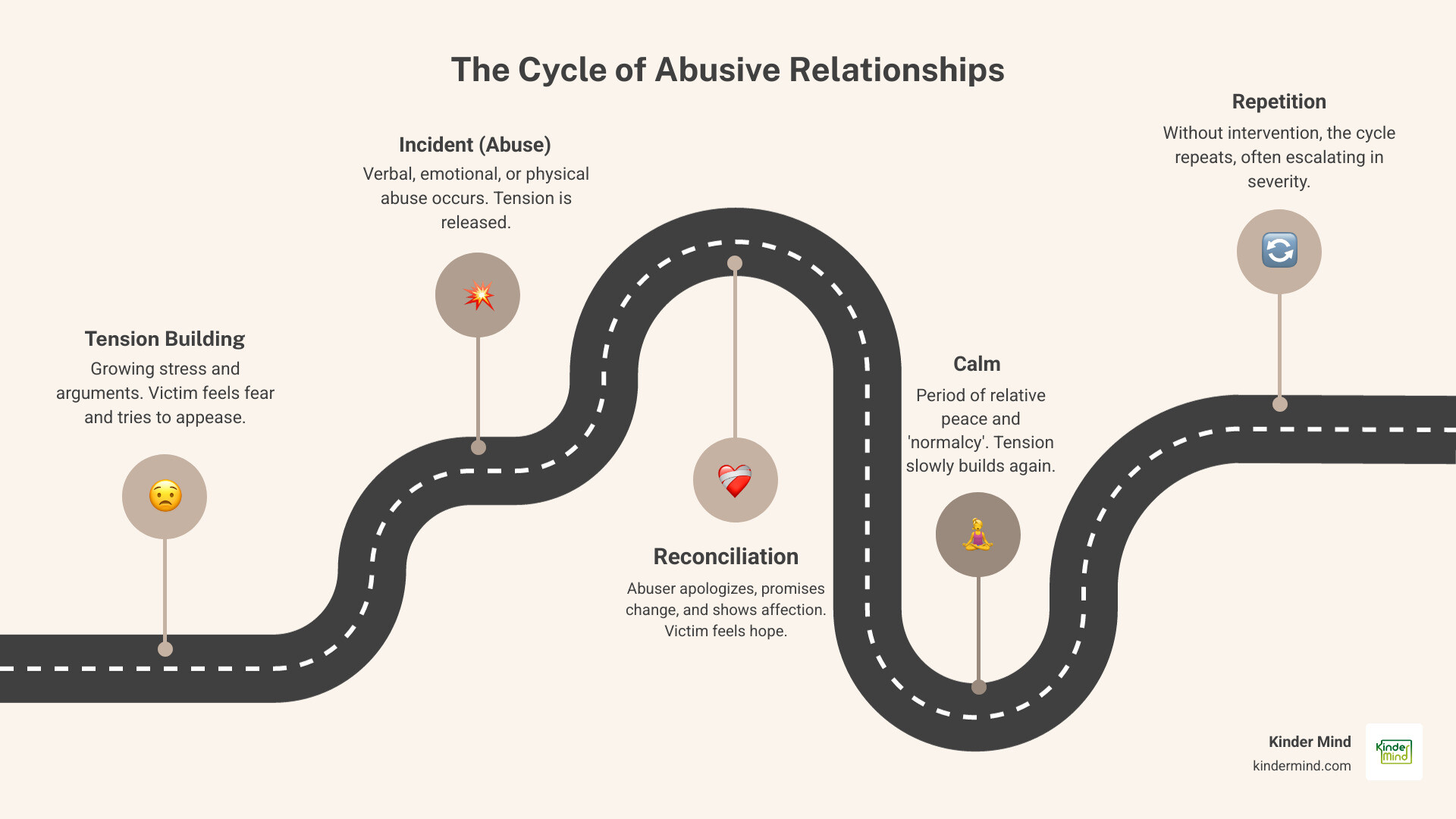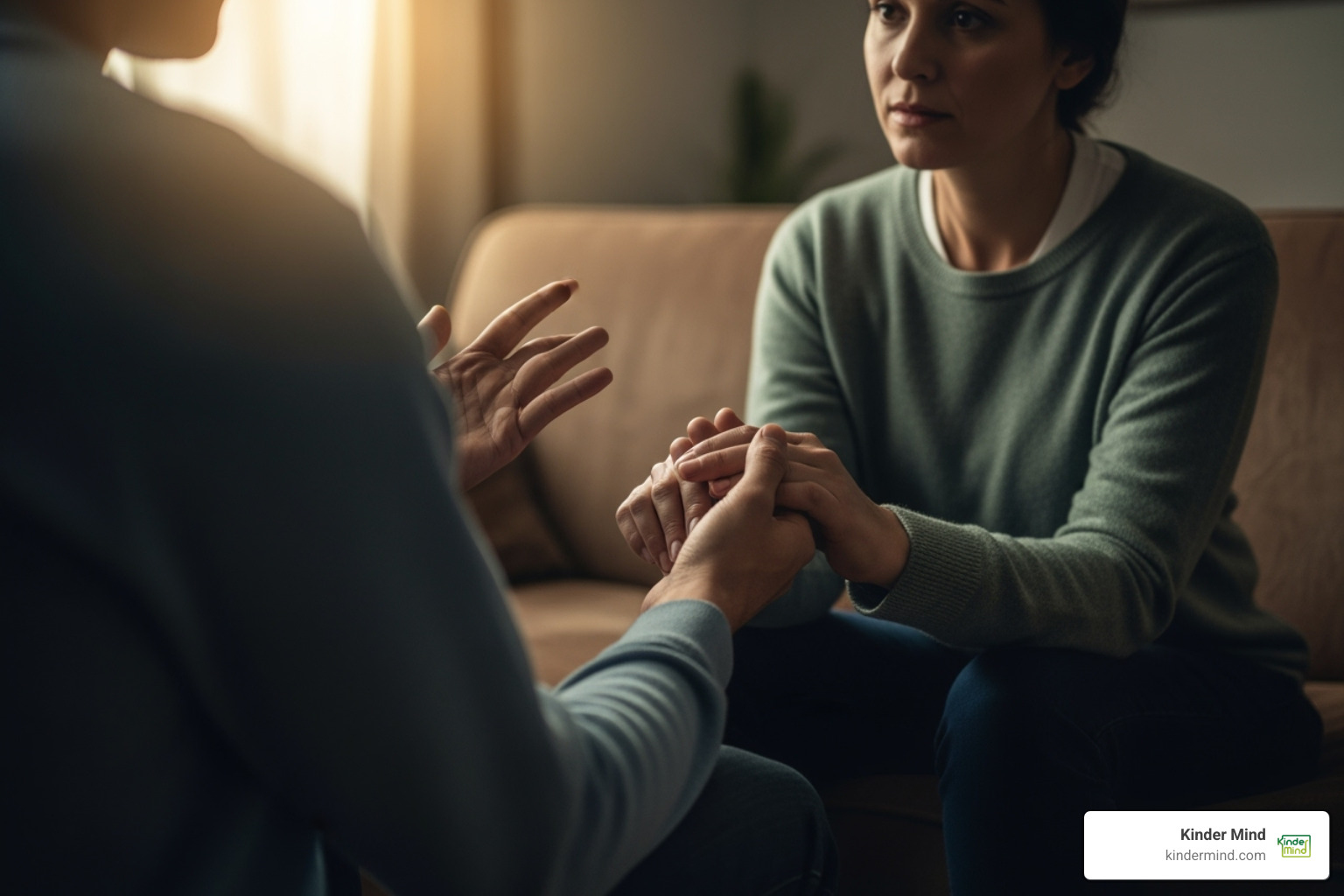Rebuilding Trust: How to Heal From Relationship Trauma
Understanding the Path Forward After Painful Relationships
Healing relationship trauma means understanding that while the emotional wounds from harmful relationships are deep, recovery is possible. Many people struggle with the aftermath, experiencing flashbacks, trust issues, and difficulty forming new connections. With the right support and strategies, you can rebuild your sense of self and create healthier relationships.
Quick answers for healing relationship trauma:
- Create safety - Establish physical and emotional distance from harmful situations
- Seek professional support - Therapy helps process trauma and develop coping skills
- Practice self-compassion - Replace self-criticism with kindness toward yourself
- Build boundaries - Learn to communicate your needs and limits clearly
- Connect with others - Trusted friends, family, or support groups reduce isolation
- Take your time - Healing isn't linear and varies for everyone
Relationship trauma occurs when a trusted person causes harm through abuse, betrayal, or control. While research shows 1 in 3 women and 1 in 4 men experience physical abuse by a partner, trauma also includes emotional abuse, gaslighting, and betrayal, which leave lasting psychological scars.
The impact is deep, often leading to anxiety, depression, or PTSD-like symptoms. Trust falters and self-esteem plummets. Some develop post-traumatic relationship syndrome (PTRS), where shame prevents them from confronting the past.
What matters most is this: you're not broken, and you're not alone. Millions have walked this path and found their way to healthier lives. This guide offers understanding and concrete steps for your own healing journey.

Understanding Relationship Trauma and Its Impact
When someone you love hurts you through manipulation, abuse, or control, the wounds go deep. Healing relationship trauma requires understanding what makes these experiences so damaging.
Relationship trauma stems from abuse between intimate partners, where one person uses control or manipulation to dominate the other, dissolving safety and creating persistent fear. Many survivors develop what researchers call Post-Traumatic Relationship Syndrome (PTRS), a pattern similar to Post-Traumatic Stress Disorder (PTSD). Survivors experience intrusive thoughts, flashbacks, and nightmares. The key difference is that with PTRS, avoidance symptoms are often driven by shame about the abuse, rather than fear. This shame can create a prison of silence, hindering the healing process.

| Symptom Category | PTSD | PTRS (Relationship Trauma) |
|---|---|---|
| Intrusive | Flashbacks, nightmares, intrusive thoughts, intense distress | Flashbacks, nightmares, intrusive thoughts, fixation on past relationship |
| Avoidance | Avoiding thoughts, situations, people related to trauma | Avoidance largely driven by shame (e.g., hiding the abuse, avoiding discussion of the relationship) |
| Negative Mood | Negative beliefs, detachment, anhedonia | Guilt, shame, loss of self-esteem, difficulty controlling emotions |
| Arousal | Hypervigilance, irritability, sleep problems, concentration issues | Suspicion, hypervigilance, anxiety, difficulty concentrating, sleep problems |
The long-term effects are pervasive, compromising your ability to connect with others. You might build emotional walls, let fear guide your decisions, or develop unhealthy coping mechanisms. These are not character flaws; they are survival responses.
Common Signs and Symptoms
Recognizing the signs of relationship trauma is your first step toward healing. Common symptoms include:
- Flashbacks: Sudden, vivid memories that feel like re-living the trauma.
- Persistent Fear or Distress: A constant sense of unease, even in safe situations.
- Guilt and Shame: Blaming yourself for the abuse or for not leaving sooner.
- Nightmares: Disturbing dreams that replay the trauma.
- Trust Difficulties: A deep-seated suspicion that makes new relationships feel threatening.
- Emotional Numbness: A protective mechanism to avoid painful feelings.
- Avoidance: Steering clear of people, places, or topics that remind you of the trauma.
These symptoms are evidence that you survived something difficult.
More info about trauma symptoms
Betrayal Trauma vs. Other Forms
Betrayal trauma, a concept from psychologist Jennifer Freyd, is a specific type of trauma that occurs when someone you depend on for survival or support is the one who hurts you. This is common in cases of childhood abuse by a caregiver or infidelity in a dependent partnership.
The need to preserve the relationship can lead to what Freyd calls "betrayal blindness," where the mind unconsciously ignores the betrayal as a survival mechanism. Infidelity, for example, can cause a devastating loss of self-worth, intrusive thoughts, and a loss of faith in others. Childhood betrayal has even more profound effects, often leading to attachment issues, difficulty managing emotions, and other long-term mental health challenges.
Betrayal trauma theory as a concept
The Dynamics Behind Relationship Trauma
Healing relationship trauma begins with understanding how it develops. These wounds grow from a gradual, often subtle, imbalance of power where one person systematically controls or manipulates the other. Common tactics include:
- Gaslighting: Denying your reality to make you question your own perceptions.
- Control: Dictating your choices, monitoring your activities, or isolating you from your support network.
- Love-bombing: Showering you with intense affection early on to create a powerful hook, only to withdraw it later.
- Manipulation and Belittling: Using criticism, insults, or emotional blackmail to erode your self-esteem.
While external stressors can worsen these dynamics, the abuse stems from the abuser's choice to seek power. The result is a constant state of fear and anxiety that takes a profound toll on your well-being.
More info about control issues
What is Trauma Bonding?

Trauma bonding explains why it's so hard to leave a harmful relationship. It's not love, but an intense emotional attachment formed through a cycle of abuse followed by affection. This unpredictable pattern of punishment and reward creates a powerful psychological hook.
After an incident of abuse, the abuser may apologize or show affection, giving you a sense of relief and hope. You might rationalize their behavior, believing the "good" person will return. This bond is a survival mechanism, not a weakness. Breaking a trauma bond requires recognizing it as a response to abuse and seeking support to untangle these psychological ties.
Key Strategies for Healing Relationship Trauma
Healing relationship trauma is a journey of teaching your body and mind that the danger has passed. This requires experiential healing—showing your nervous system it's safe through consistent practice.
- Create a safe environment: This is essential. Physically and emotionally remove yourself from harmful situations and set firm boundaries.
- Regulate your nervous system: Trauma leaves the nervous system stuck in 'fight, flight, or freeze.' Use grounding techniques (e.g., feeling your feet on the floor), mindful breathing, and sensory calming activities (e.g., warm tea, soft music) to restore balance.
- Build a support system: Connect with trusted friends, family, or a support group. Co-regulation—feeling seen and heard by a safe person—is powerfully healing.
- Communicate your needs: Reclaim your voice by clearly stating what you need, such as asking a partner to just listen without questioning when you share your experience.
- Engage in calming activities: Time with pets, being in nature, creative hobbies, and gentle movement like yoga can help release stored tension.
- Prioritize basic self-care: Consistent, balanced meals, regular sleep, and gentle movement are the foundation for emotional recovery.
More info about trauma recovery
The Role of Self-Compassion and Self-Care in Healing Relationship Trauma
Self-compassion is essential for healing. Criticizing yourself makes change harder; accepting yourself where you are creates the inner safety needed to move forward.
- Practice Mindfulness: Focusing on the present moment interrupts the cycle of rumination (replaying painful thoughts). Mindfulness helps you observe intrusive thoughts without getting swept away, which research shows fosters self-compassion.
- Choose Self-Kindness: Replace your harsh inner critic with a gentler voice. Speak to yourself as you would a friend.
- Meet Your Basic Needs: Eating well, getting enough sleep, journaling, and finding creative outlets are not luxuries—they are necessary acts of self-care that support your healing.
Research suggests mindfulness reduces rumination
How to Establish Healthy Boundaries
Establishing healthy boundaries is a powerful step in healing relationship trauma. They are about self-empowerment, not controlling others—they are your personal guidelines for what you will and will not tolerate.
- Prevent Future Trauma: Boundaries act as a protective shield. They help you identify people who respect your limits and avoid those who don't.
- Identify Your Deal-Breakers: Get clear on what behaviors are absolutely unacceptable to you in a relationship. This is crucial for choosing healthier connections.
- Communicate Clearly and Assertively: Use calm, firm "I" statements to express your needs (e.g., "I need time alone when I feel overwhelmed").
- Practice Saying 'No': "No" is a complete sentence. It's a powerful tool for upholding your boundaries and prioritizing your well-being without needing to justify your decision.
More info about relationship issues
When and How to Seek Professional Help
Recognizing when you need support is a sign of strength. If trauma symptoms like flashbacks or avoidance are disrupting your daily life, work, or relationships, it may be time to seek professional help. Feeling constantly overwhelmed is another clear signal. A therapist can provide an objective perspective, evidence-based tools, and a safe space to process your experiences without judgment. You don't have to carry the weight alone; a professional can be a partner in your healing journey.
More info about trauma-informed care
Types of Therapy for Healing Relationship Trauma
Several therapeutic approaches can help with healing relationship trauma:
- Individual Therapy: Provides a dedicated space to learn coping skills, process complex emotions like guilt and shame, and establish healthy boundaries.
- EMDR (Eye Movement Desensitization and Reprocessing): Helps the brain reprocess distressing memories, reducing their emotional intensity so they no longer control your present.
- Cognitive Behavioral Therapy (CBT): Focuses on identifying and challenging negative thought patterns and beliefs that stem from trauma, replacing them with healthier ones.
- Somatic Therapy: A body-focused approach that helps release trauma stored physically in the nervous system, helping you feel safer in your own body.
- Psychodynamic Therapy: Explores how past experiences and unconscious patterns influence your current struggles and relationship dynamics.
In some cases, a psychiatrist may recommend medication to manage severe symptoms, providing stability to support the therapeutic process.
Challenges in Couples Therapy
Couples therapy after trauma is a delicate but potentially transformative process, requiring commitment from both partners.
- Rebuilding Trust: This is a slow process that requires the partner who caused harm to take full accountability and demonstrate consistent, trustworthy behavior.
- Ensuring Safety: The therapy space must be a safe zone, free from fear of re-traumatization. A skilled therapist will manage power dynamics to ensure both partners feel secure.
- Navigating Triggers: The couple learns to recognize and manage trauma triggers together, with the therapist's guidance.
- Rupture and Repair: The core of rebuilding is learning to consciously repair conflicts and misunderstandings. This process of acknowledging hurt and mending the connection strengthens the relationship.
Approaches like the Gottman Method can be adapted to improve communication and rebuild fondness. Healing as a couple is an intensive journey that requires a therapist skilled in trauma-informed care, like the compassionate therapists at Kinder Mind.
More info about couples therapy
Frequently Asked Questions about Healing Relationship Trauma
How long does it take to heal from relationship trauma?
There is no set timeline for healing relationship trauma. The journey is personal and depends on many factors, including the severity of the trauma and your support system. Healing is not linear; you will have good days and setbacks. This is a normal part of recovery. Be patient with yourself and focus on progress, not perfection. Celebrate small victories along the way.
Can a relationship survive after trauma?
Yes, a relationship can survive trauma, but it requires genuine commitment from both partners. If the trauma occurred within the relationship, survival depends on three key conditions:
- Safety is paramount: All abusive behavior must stop completely.
- Both partners must be committed to healing: The person who caused harm must take full responsibility, while the person who was harmed needs space and support.
- Professional help is often necessary: A trauma-informed couples therapist can guide the process of rebuilding trust and communication. Individual therapy for both partners is also crucial.
What is the difference between a difficult relationship and a traumatic one?
A difficult relationship has conflict and disagreements, but there is still mutual respect and a fundamental sense of safety. Both partners generally want to resolve issues.
A traumatic relationship is fundamentally different. It is defined by:
- A power imbalance: One partner consistently seeks to control, dominate, or diminish the other.
- Persistent fear: You find yourself constantly walking on eggshells to avoid your partner's unpredictable reactions.
- Erosion of self: The abuse chips away at your self-esteem, confidence, and sense of reality (often through gaslighting).
While difficult relationships cause stress, traumatic relationships cause deep psychological wounds. A persistent feeling of being unsafe is the clearest sign you're dealing with trauma, not just difficulty.
Conclusion
Healing relationship trauma is a courageous journey, and reading this shows your readiness to reclaim your life. The path isn't always easy, but healing is absolutely possible. You are not alone. Countless people have found their way back to themselves after traumatic relationships, and you can too.
Healing takes time and patience. There will be progress and setbacks, which is a normal part of recovery. The most important thing is to keep moving forward with self-compassion.
Taking the first step can feel overwhelming, but you don't have to do it alone. Reaching out for support is an act of self-respect. At Kinder Mind, we make mental health care accessible, affordable, and genuinely compassionate. Our therapists specialize in trauma-informed care and are here to support you without judgment, whether you need individual or couples therapy. We offer in-person and virtual sessions and accept various insurance plans to ensure you get the support you need.
You deserve to feel safe, respected, and to have relationships that lift you up. Most importantly, you deserve to heal.



